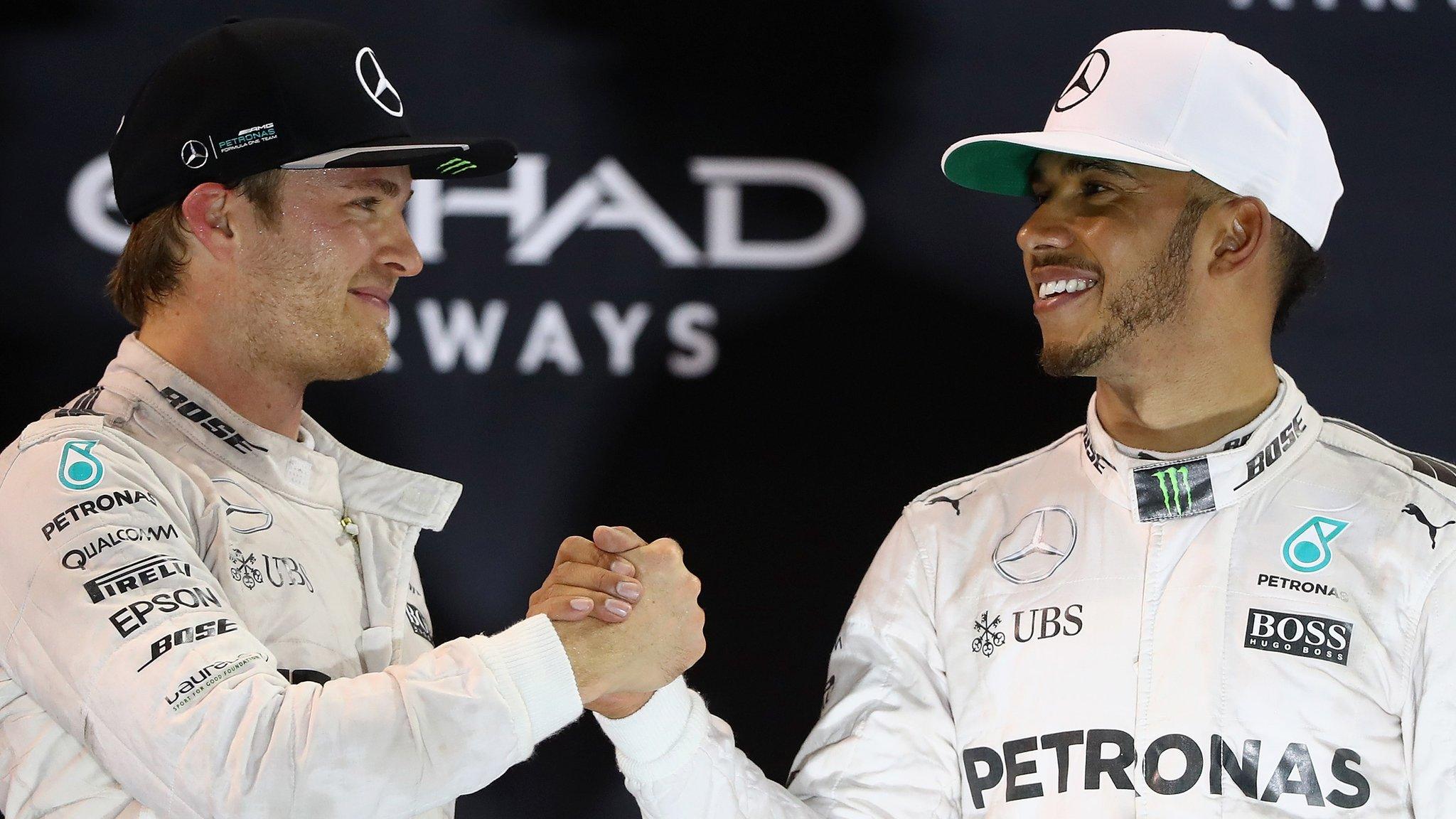Lewis Hamilton did nothing wrong in Abu Dhabi decider
- Published
- comments
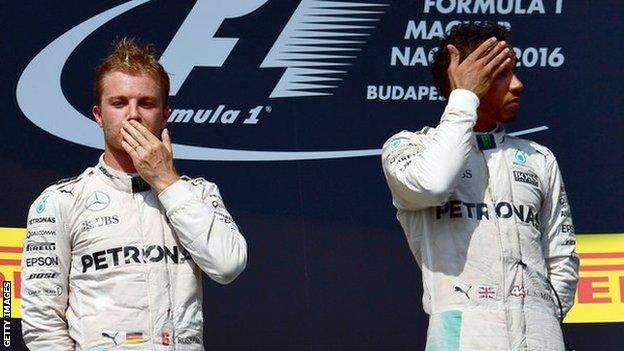
Before we consider the fall-out from the Abu Dhabi Grand Prix, it might be helpful to look at a few statistics as context.
Mercedes have won 51 out of 59 races in the last three years. This is their third consecutive one-two in the world championship.
This year alone, world champion Nico Rosberg scored 50% more points than the man in third place, Red Bull's Daniel Ricciardo.
It is a staggering performance from one team. And as Mercedes talk about waiting to let the dust settle before deciding whether to punish Lewis Hamilton for deliberately backing Rosberg into rivals in Abu Dhabi, they maybe ought to cast their minds back to the 2013 US Grand Prix.
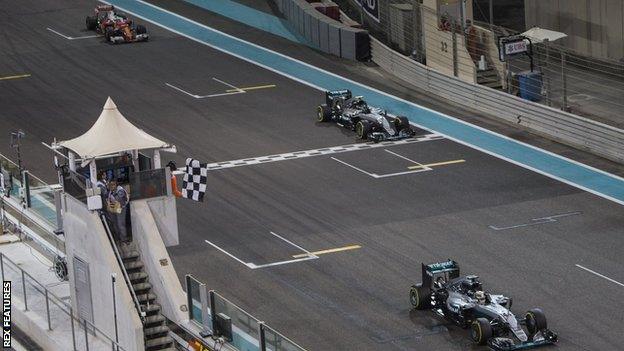
Hamilton finishes just ahead of Rosberg after deliberately slowing down to back Rosberg into rivals
Sebastian Vettel had already won his fourth consecutive world title for Red Bull two races earlier in India, and Austin was a record eighth consecutive win in a single season.
As Vettel celebrated on his slowing down lap, he came over the radio and said to the team: "We must enjoy these days while they last."
They lasted for exactly one more race, before Mercedes' domination started with a change of regulations at the beginning of 2014.
That is something for Mercedes to ponder as Formula 1 prepares for another major rule change in 2017.
Why did Hamilton do it?
Hamilton's actions arose out of a culmination of two things.
The first was a world championship season that came down to the last race.
It might not have done, after the big turnaround in points following Hamilton's engine failure while leading in Malaysia. It did because Hamilton had a very clear focus on getting pole and winning at the last four races of the season, and he delivered.
At the same time, Rosberg's focus was on the championship and he could be risk-averse. He knew he just needed to pick up the points to win the title, so his mentality and game plan changed.

Longest wait for an F1 title: Mr Rosberg slots nicely into second here: with a 10-year wait over 206 races. Source: Forix
The second issue at play was that this was Rosberg's best chance of winning a world title.
Partly because, as Vettel said, you never know what's just around the corner and it was the first time he had gone into a title decider ahead. And given his and Hamilton's relative performances over their careers, that has to be considered unlikely to happen again.
Brazil was Rosberg's risk race - with the rain and the Red Bull performance there. And he got through that.
But he had been on pole in Abu Dhabi for the last two years, he won there in 2015, the weather is predictable, Mercedes were always going to dominate.
It was illuminating to see the difference in vision after the race between the three main bosses of the Mercedes team - Toto Wolff, Paddy Lowe and Niki Lauda.
Lauda, the ex-racing driver, said: No problems, that's what it was. The commercial person, Wolff, and the engineer, Lowe - the two people who think strategically - were not happy because it did not fit the criteria they had laid out.
But Hamilton and Rosberg were hired to be ruthless, to win races and world titles. Not because they were nice guys. They were hired to do what they had to do to win.

Rosberg & Hamilton have more in common than they might think: In Washington state, USA, the towns of Rosburg and Hamilton are just 250 miles apart, and have the same number of residents each, at 300. Combined, that is 100 fewer than there are employees at Mercedes F1's factory in Brackley, UK
If you put a tiger in a cage and the keeper goes in, you can't expect the tiger not to bite at some point.
Racing drivers are very emotionally driven. They are aggressive, determined and focused, and in situations like that they have two hours to determine whether they are world champion… or not.
If the situation had been reversed, I'm sure Rosberg would have done the same thing.
Hamilton did nothing wrong
This issue of the boundaries of acceptable competition between two drivers in the same team has already come up twice this year - in Spain and Austria.
When a crash took them both out in Barcelona, you could argue Hamilton stuck his nose into a decreasing gap, or that Rosberg closed the door, depending on your point of view.
In Austria, you could do the same, but it was more clear-cut - Rosberg was a bit clumsy in his defence on the last lap, and he was penalised for it by the stewards.
After neither of those incidents was a driver suspended, so it is hard to see how that could happen now. It feels like hot air.
Yes, Mercedes warned them after Austria that they faced a ban if they collided again. But that's not what happened in Abu Dhabi.
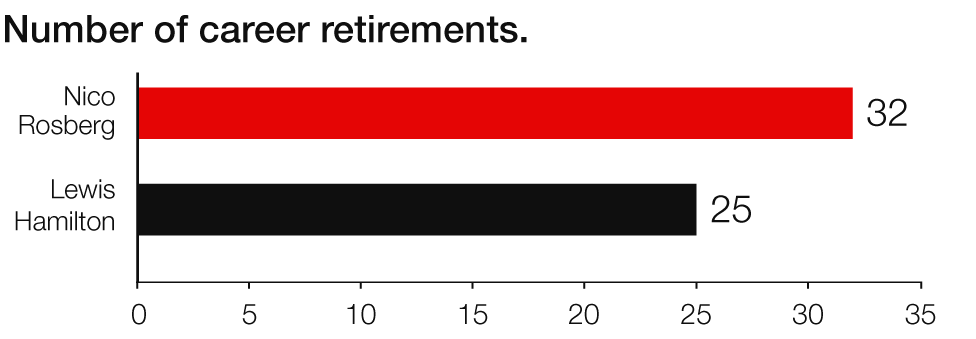
Rosberg may have had the better of the reliability this season, but it has not always been that way
Hamilton did nothing wrong within the rules of F1. Equally, he could have been a lot tougher on Rosberg than he was. He drove slowly all race, but he could have backed him up much more aggressively than he did, rather than gradually turning the screw.
The only thing he did 'wrong' was to break the Mercedes rules of engagement. But you have to question whether those rules should even have been there in this situation.
Those are internal team rules and are there to ensure drivers do not compromise the interests of the team. But in this situation the interests of the team were largely irrelevant. Mercedes had already won both titles.
The only dynamic that was ever going to change was whether Mercedes won 18 or 19 races out of 21 this year.
You have to balance that off with the over-riding philosophy they have applied: the drivers are free to race. Which has been the main positive of the last three years. And for that I applaud Wolff, Lowe and Lauda.
For me, in that situation, it was down to two guys out on the track. Hamilton did nothing wrong and I don't think there is a driver in the pit lane worth his salt who would not have done the same thing.
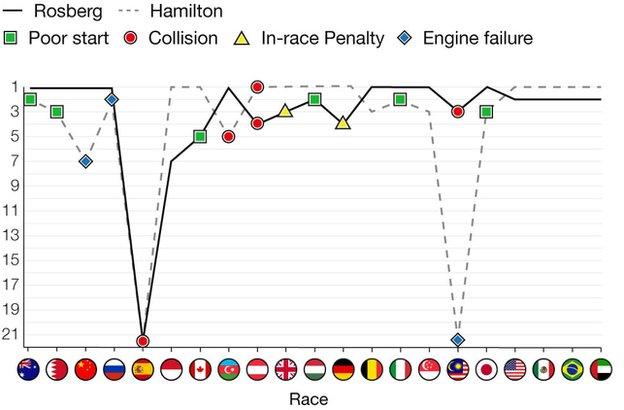
Hamilton won ten races this season and Rosberg only won nine, yet still won the Championship
What should Mercedes do?
Nothing went wrong in Abu Dhabi. Rosberg won the championship; Hamilton won the race. Mercedes have got what they wanted from the year - and by that I don't mean they wanted Rosberg to win the title over Hamilton, because I don't believe that.
In this situation, a team has to be very careful because it is easy to alienate a driver by penalising him for effectively doing what he is paid to do.
Equally, Hamilton is effectively their number one asset and they may well need him if the competition is closer next year.
He is a driven man, and if he does not feel he is getting the support he needs, he will look for other options.
My view is that it is history. Mercedes should enjoy the champagne and let it go.
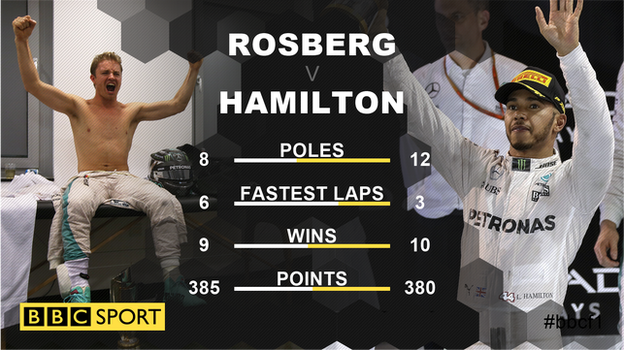
Key points of the season - and a brief look at 2017
Casting over the data from 2016, Red Bull's development progress from the beginning to the end of the year was phenomenal.
In 2015, they scored 187 points. This year, they scored 468. In the first half of the year, their average gap to pole was 0.963 seconds; in the second it was 0.560secs.
For the first five grands prix of the year, they scored on average 19 points a race; for the last five it was 25.
At the same time, Ferrari scored an average of 22 points a race in the first five races and 16 in the last five.
Another alarming statistic for Ferrari is that after round eight in Azerbaijan, Sebastian Vettel was only 19 points behind Hamilton in third place in the championship. He ended the season 13 races later 168 points behind.
That reveals the trajectory of the two teams.
Will Rosberg and Hamilton become best of friends, again?
Going forward into 2017, it is Red Bull's big opportunity to close up to Mercedes with the new rules.
Ferrari have done a lot of internal reorganisation, but it has to be a concern that, having split with technical director James Allison in July, they are now clearly in a worse situation than they were then.
Ferrari's numbers suggested a downward trend throughout the year. And their average qualifying gap to Mercedes is exactly the same as it was in 2015, when they won three races. This year, they won none.
Another team who made progress through the year were McLaren. They were an average 2.5secs off the pace in 2015. This year, it was 1.8secs and the trend line is definitely positive.
In the first half of the year, they were 2.1secs off on average in qualifying and in the second, 1.7secs.
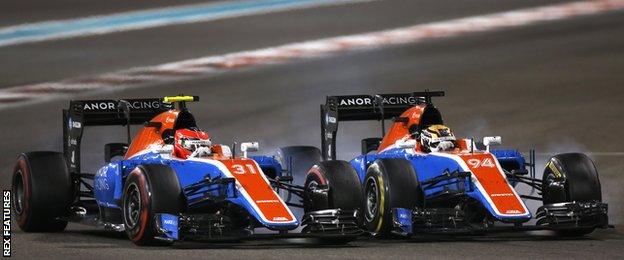
Esteban Ocon and Pascal Wehrlein are part of a group of bright young talent - when they are not crashing into each other
That gap is not all down to the Honda engine. The car also needs to improve. But they ended the season only 0.4secs off Force India.
Finishing the season fourth was their target, so they fell a little shy of that, but the upward direction is very clear and, with the promising Stoffel Vandoorne coming in alongside Fernando Alonso in 2017, we could see a few more smiles there next year.
Force India got the fourth place McLaren wanted and were a star of the season. Yes, they have a Mercedes engine, but they have very limited resources and they marshalled them superbly to leapfrog Williams and finish fourth in the championship.
Finally, the shift in driver generations is accelerating this winter.
Jenson Button and Felipe Massa have gone. Max Verstappen is already a big star, and the likes of Esteban Ocon, Pascal Wehrlein and Vandoorne are coming up fast, with a few more waiting in the wings, such as Red Bull reserve and GP2 champion Pierre Gasly, his GP2 team-mate Antonio Giovinazzi and Ferrari development driver Charles Leclerc.
It is a definite wave and it is quite an exciting future on that front.
Allan McNish was talking to BBC Sport's Andrew Benson
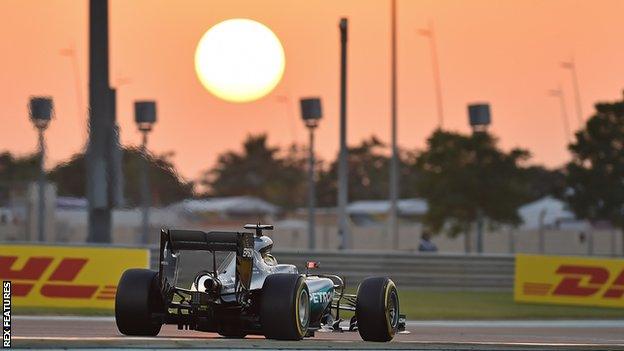
- Published29 November 2016
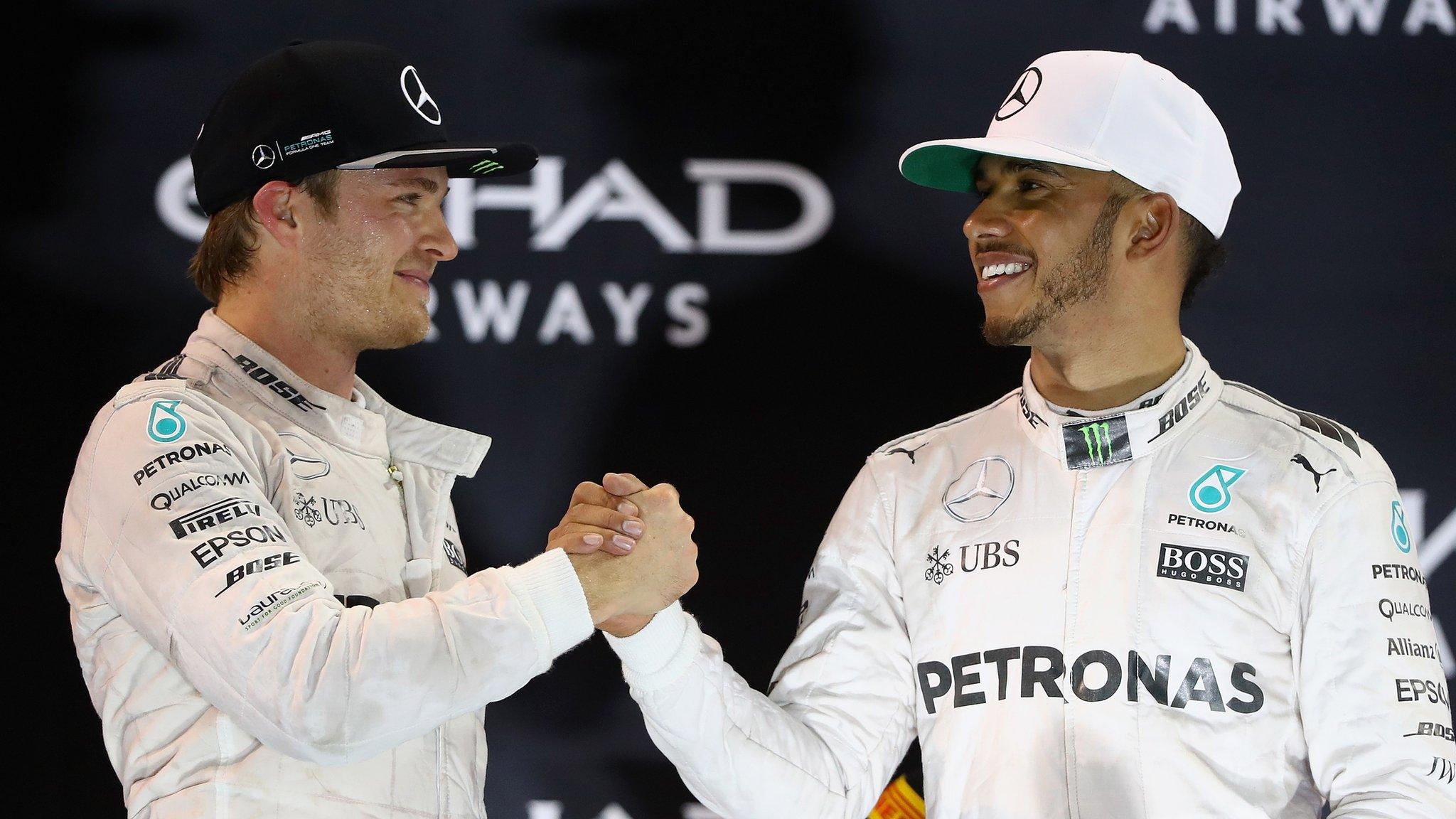
- Published28 November 2016
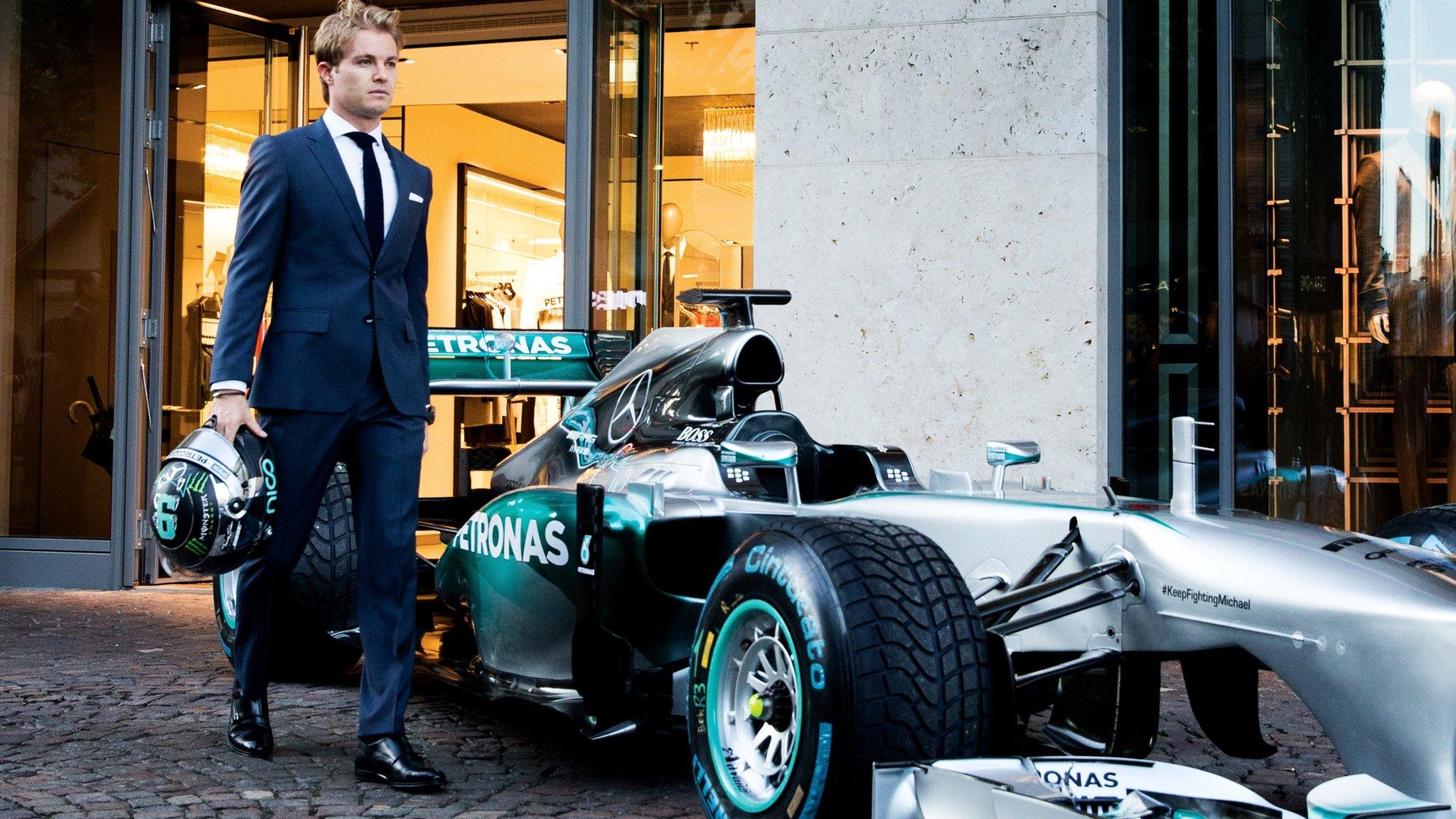
- Published28 November 2016
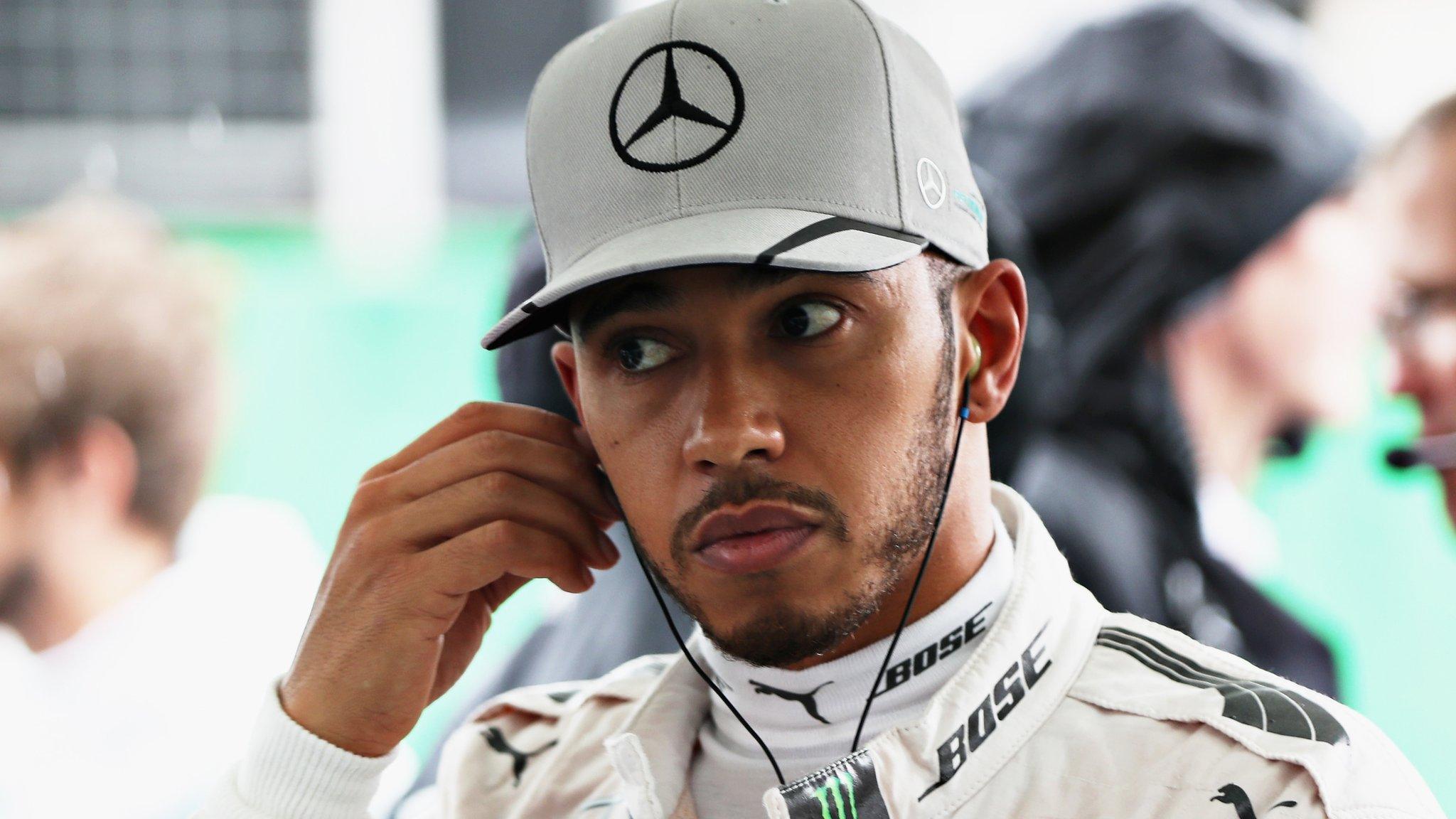
- Published28 November 2016
